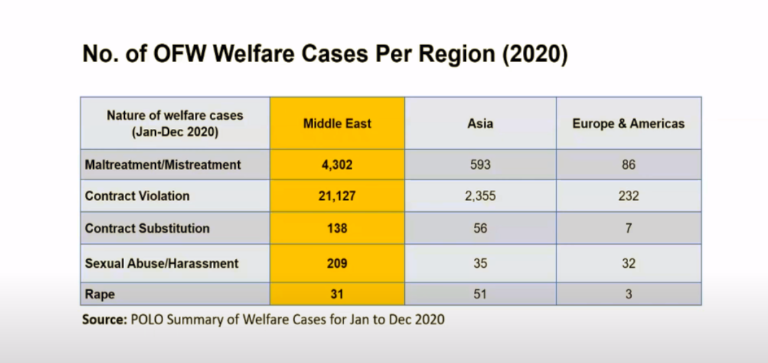
By: Christia Marie Ramos – Reporter / INQUIRER.net / March 08, 2021
MANILA, Philippines — A foreign affairs official on Monday admitted that it was difficult to stop the abuse towards overseas Filipino workers (OFWs), particularly in the Middle East, as a senator flagged thousands of maltreatment cases among the OFWs in 2020.
“The problem begins with the practice…In the Middle East, there are sectors, for example, the household service workers, even if there’s a bilateral labor agreement [with the host country], even if everything is in place, we could the not control the abuses because they happen in the homes,” Department of Foreign Affairs (DFA) Undersecretary Sarah Lou Arriola said during a hearing of the Senate labor committee on bills to create a separate department for overseas Filipinos.
Furthermore, she noted that domestic workers are usually excluded from labor laws in Middle Eastern countries.
“We cannot control the culture. While there are a lot of reforms in the Middle East, especially starting March 12, Saudi Arabia will have reforms on the kafala system and labor mobility, this still does not include the household service workers,” Arriola said.
READ: Saudi labor reforms start March 2021
Under the kafala or sponsorship system, workers cannot transfer to other jobs without the consent of their employers. Many human rights groups have criticized this, likening it to “modern-day slavery.”
“Anywhere in the Middle East, the household service workers are always the last to be included in the abolition of exit visas and everything else,” she said.
“So, we, at the Department of Foreign Affairs would like to flag that to the legislators that even if the country of destination has complied with our requirements, there is always a disconnect between the practice and what’s on paper,” the DFA official added.
During the hearing, Senator Joel Villanueva, chair of the committee, cited a summary from Philippine Overseas Labor Offices which showed there were 4,302 cases of maltreatment among OFWs in the Middle East alone in 2020.
The data also showed that there had been 209 cases of sexual abuse and 31 cases of rape among Filipino migrant workers there.
Arriola then stressed that countries in the Middle East are “doing all they can to do reforms” which she said have been met with “resistance from some of the population.
“The resistance comes from the business sector because kafala, the abolition of kafala will entail loss of income. There are steps really being taken by most of the countries but we have to realize that it will be really difficult for any agency to be able to stop the abuse since it will take time…for all the countries, all households to uphold the rights of their household service workers,” she said.